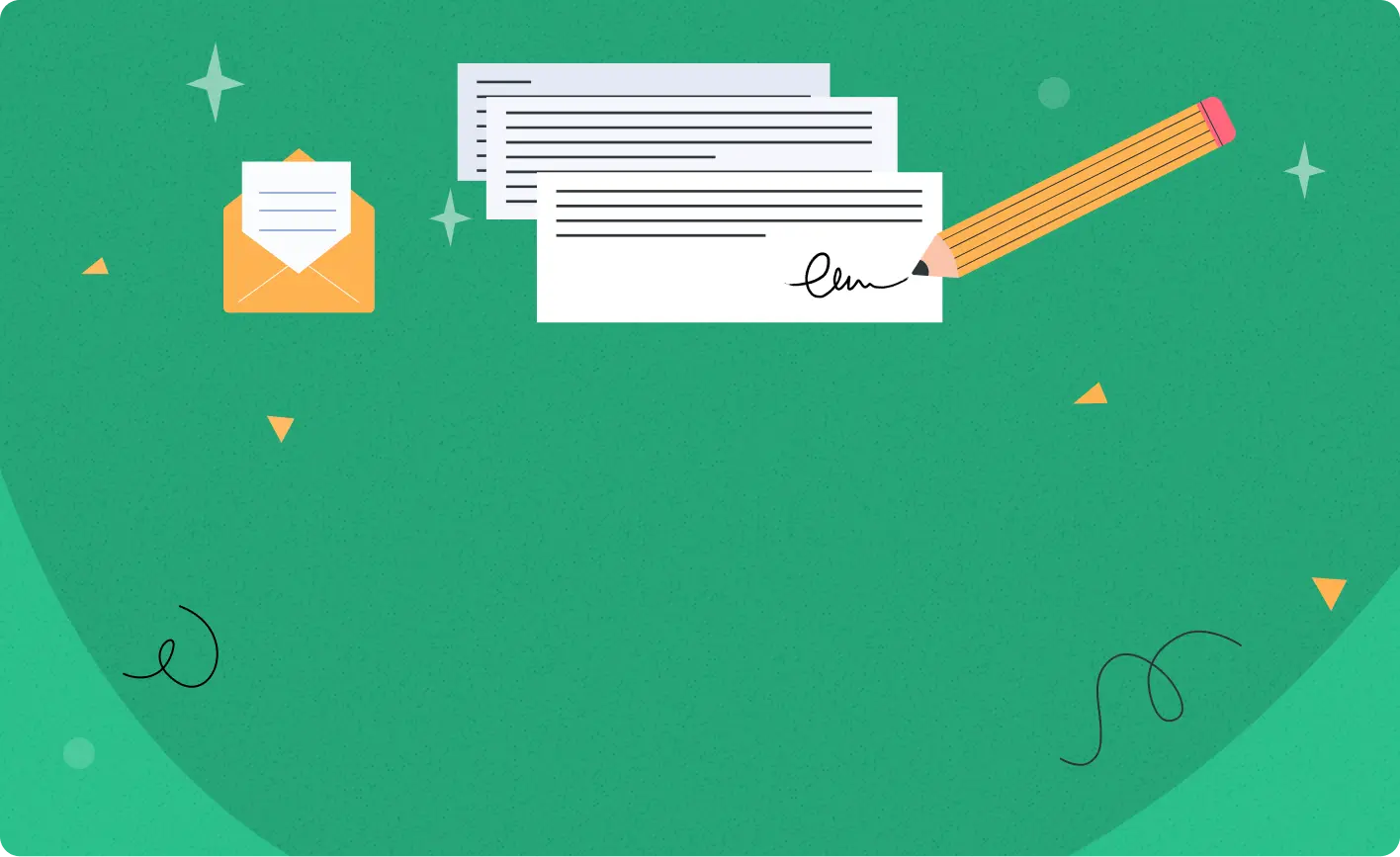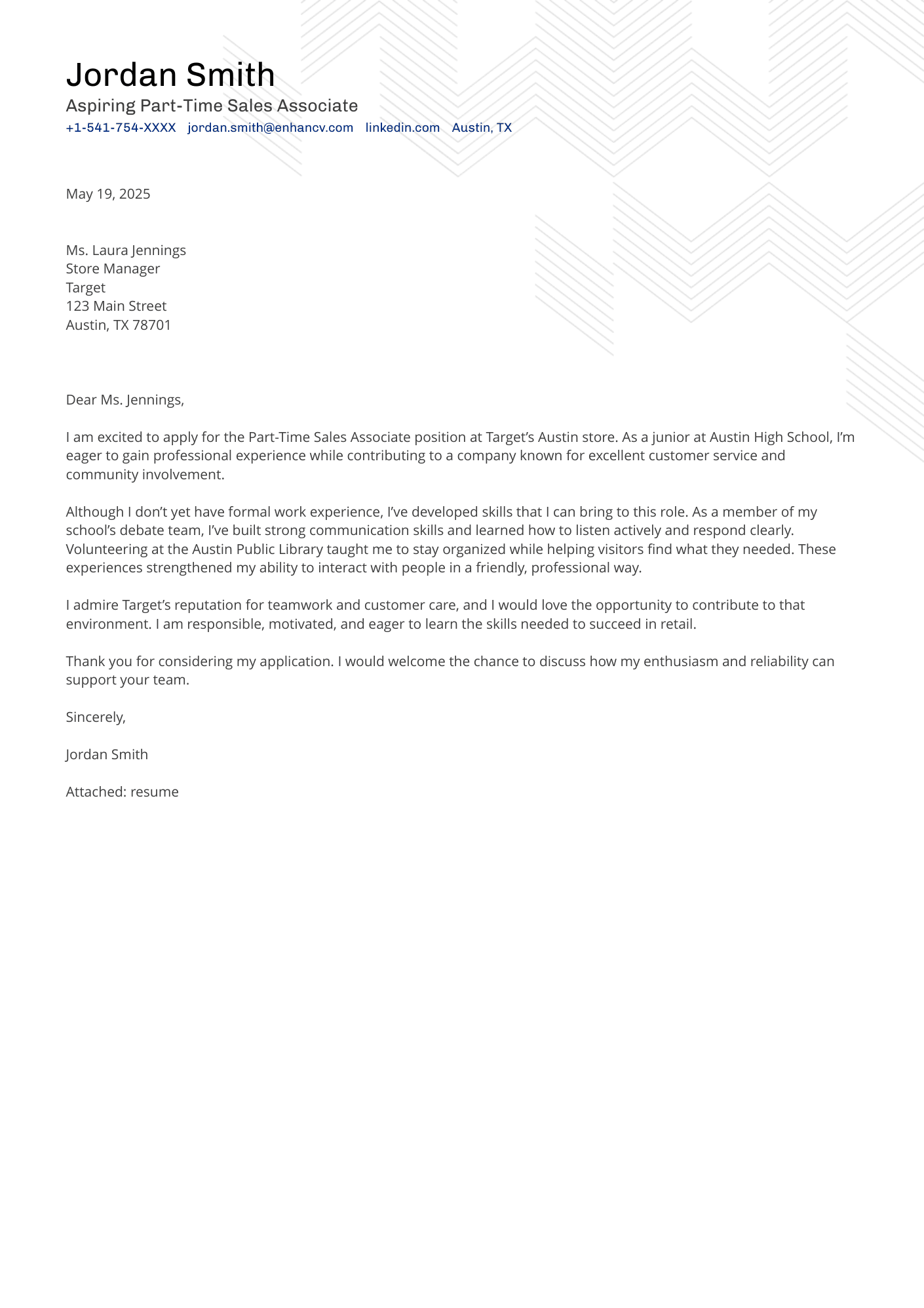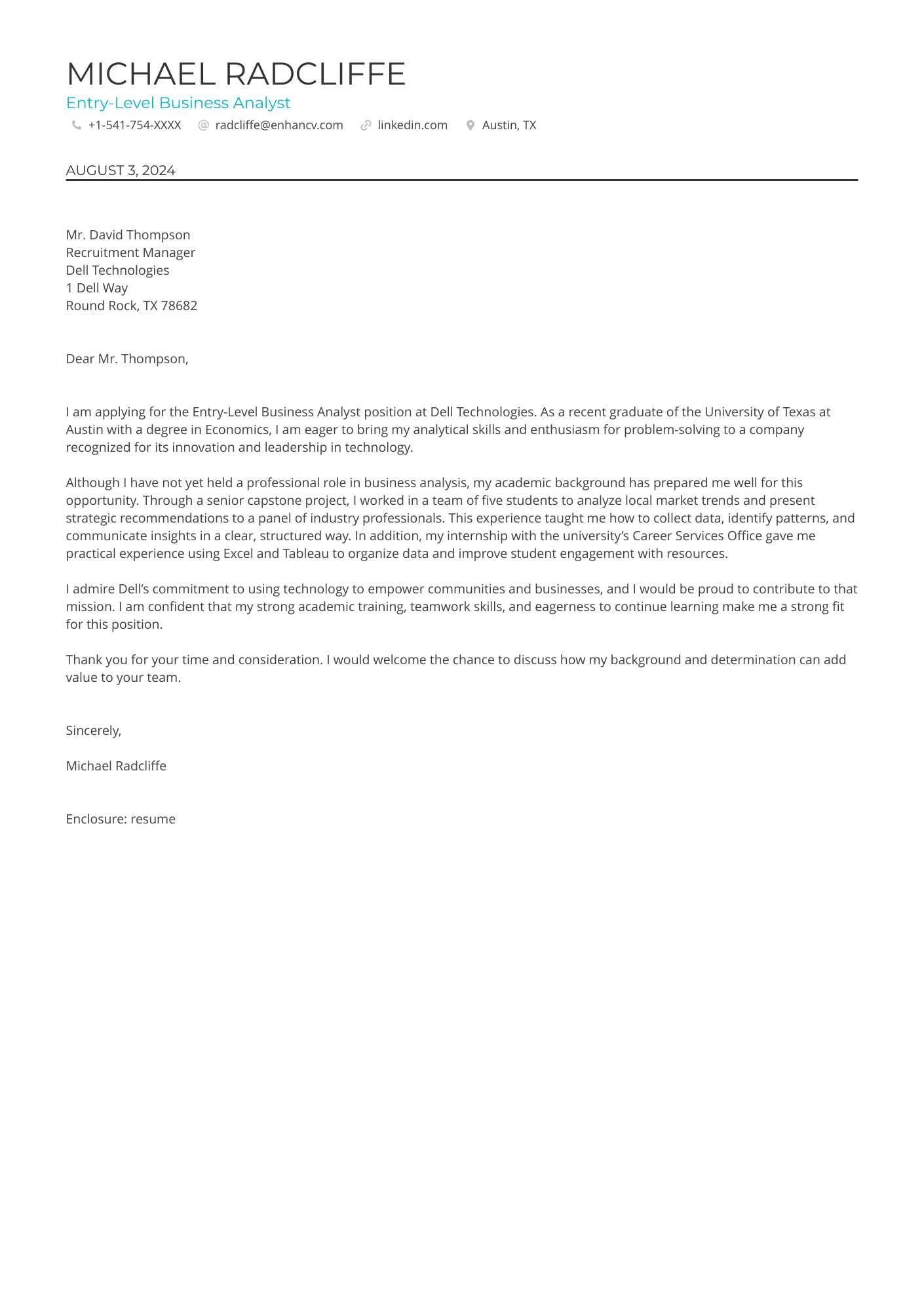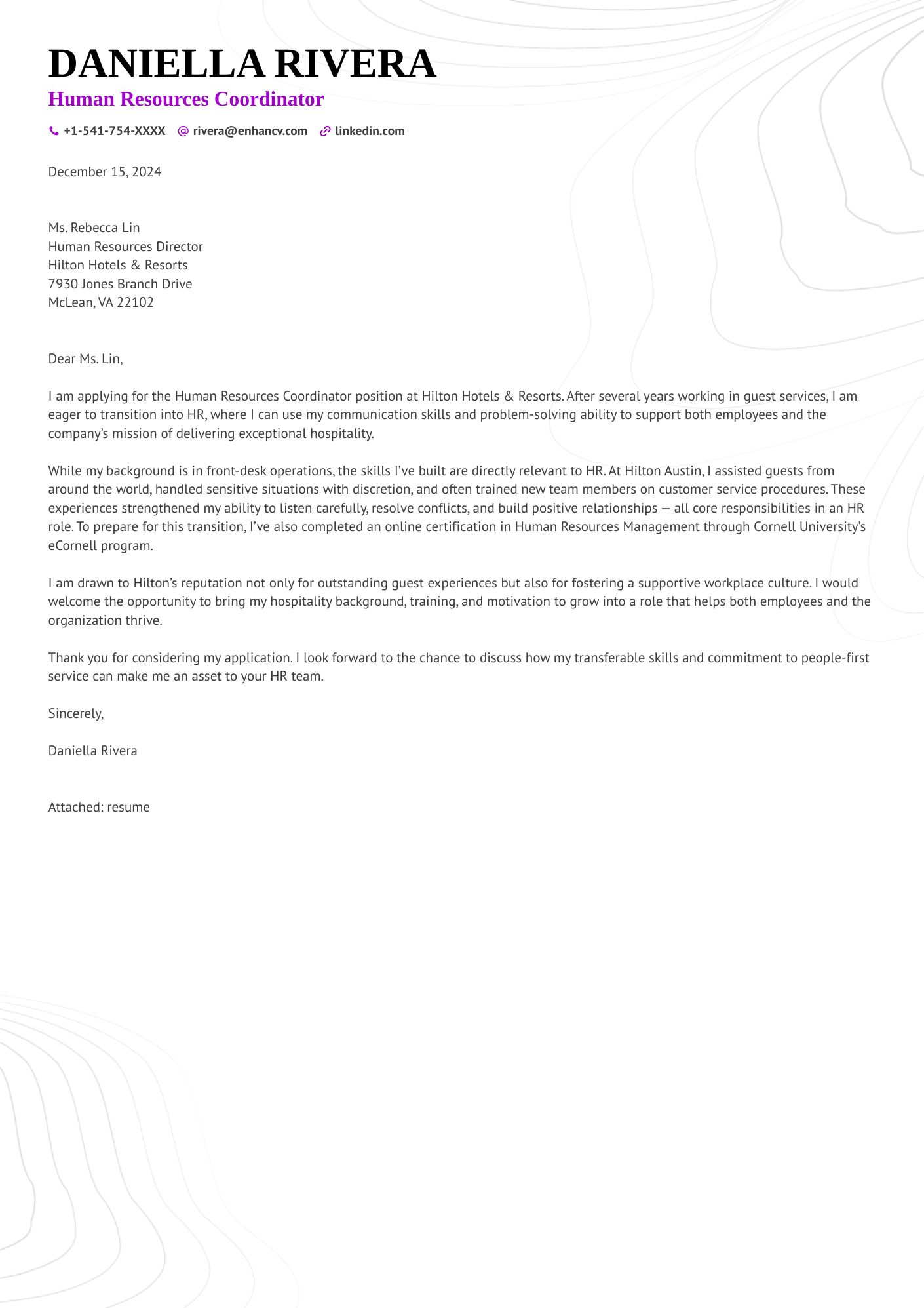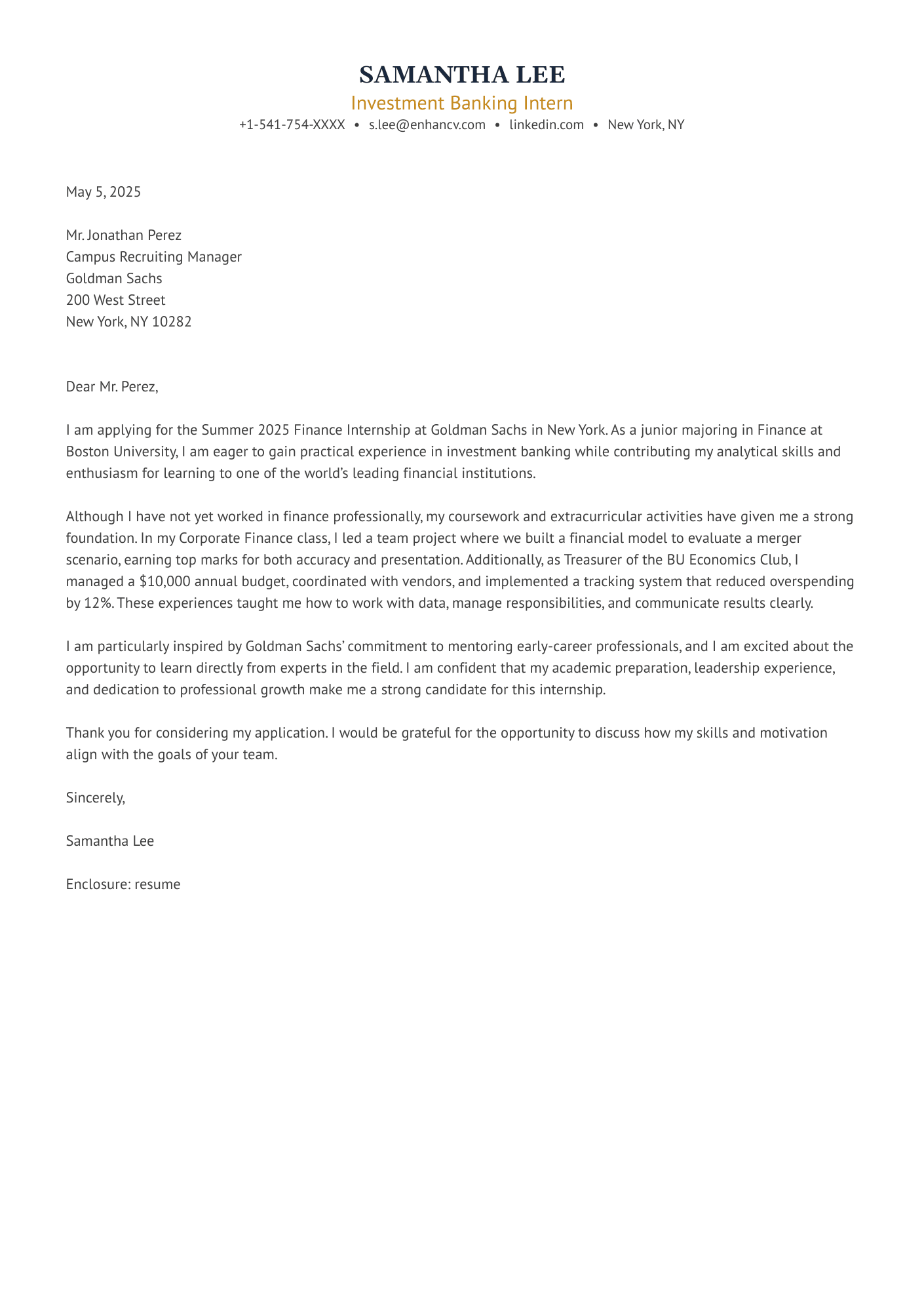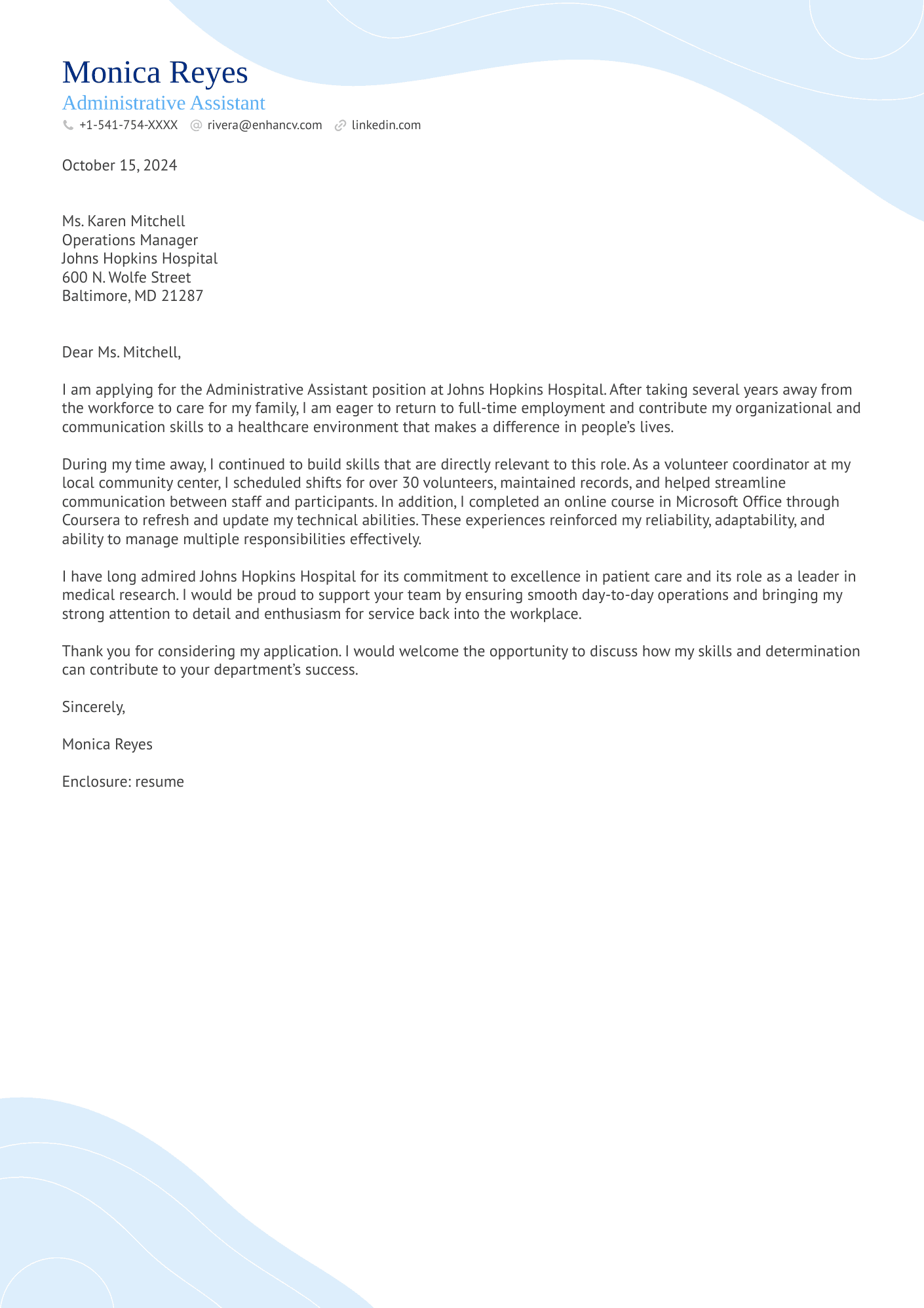Finding your first job is hard enough. Now imagine writing a cover letter for it… You’re staring at the job posting, then back at your empty resume, wondering how you’re supposed to write a cover letter when you’ve never had a real job.
Maybe you’ve just finished school. Maybe you’ve worked shifts, helped out at home, or volunteered—but nothing looks “professional.” It’s a frustrating place to be, and it’s easy to feel like you’re already behind.
You’re not. We’ve helped thousands of people in this exact spot write cover letters that actually get interviews. You have more to offer than you think and we’ll show you how to put it into words.
Key takeaways
- A cover letter matters more than ever when you don’t have formal work experience—it’s where you show initiative, motivation, and personality.
- Focus on transferable skills from school, volunteering, or personal projects, and connect them to what the employer is looking for.
- Show genuine motivation by tying your interests and values to the company’s mission or recent work.
- Employers expect beginners to have gaps, so be upfront and prove your willingness to learn and grow.
- Keep it simple: a professional format, three to four short paragraphs, and under 400 words is all you need to make a strong impression.
Our free cover letter generator is your starting point—a clean canvas where even limited experience can become a clear, compelling story.
Drop your resume here or choose a file.
PDF & DOCX only. Max 2MB file size.
Why a cover letter still matters, even without experience
When your resume is short, your cover letter becomes the most important element of your application. It’s your space to speak directly to the hiring manager—to explain your motivation, show your personality, and prove that you’ve put real thought into applying. That effort alone sets you apart.
As a certified resume writer (CPRW), I’ve worked with people at all stages of their careers, including those starting from zero. What stands out in successful applications isn’t always experience. It’s attitude. It’s curiosity. It’s how clearly someone can express their inspiration and potential.
That’s exactly what a cover letter gives you space to do.
It’s your chance to explain the why, not just the what.
Done right, it shows employers that even if you’re new, you’re ready—and that makes all the difference.
Author’s take
Here’s what a strong cover letter says about you, without saying “I have experience:”
- You take initiative.
- You’re genuinely interested in the company and role.
- You know how to communicate clearly.
- You’re aware of your strengths and how they fit the job.
- You’re motivated to learn and grow.
These are the skills employers expect from entry-level candidates, and your cover letter is where you can prove them.
Do you need a cover letter if you have no experience?
There are plenty of situations where you may not have a long list of professional roles on your resume. That doesn’t mean you don’t have value to bring—it just means your cover letter has to do more of the heavy lifting.
Common scenarios where a cover letter becomes essential
- High school student applying for part-time work: Even if your experience is limited to school projects, sports, or volunteering, your cover letter shows responsibility, teamwork, and commitment—qualities managers want in young employees.
- College graduate entering the workforce: Your degree, internships, and extracurriculars matter, but employers also want to know what drives you. A cover letter lets you connect your academic experience to the role you’re aiming for.
- Career changer switching industries: Your cover letter bridges the gap between “what you’ve done” and “where you’re headed.” It explains how transferable skills make you a fit for a new path.
- Internship applicant: Most internships don’t expect long resumes. They expect interest, initiative, and a willingness to learn. A cover letter is where you can prove you’re motivated and ready to contribute.
- Return-to-work applicant after a break: Whether you’ve taken time off for caregiving, travel, or personal reasons, your cover letter helps you reframe your story and highlight the skills you’re bringing back into the workforce.
Remember, if you’re applying without a resume full of roles, your cover letter isn’t optional—it’s your most important tool for convincing employers to give you that first opportunity.
Now, let’s move on to the process of writing a cover letter with no prior experience, with simple guidelines you can follow to create something professional and effective.
How to write a cover letter for a job with no experience
Writing your first cover letter may feel intimidating, but breaking it into clear steps makes the process much easier. Think of it as telling your story in small, focused parts: who you are, what you can bring, and why you care about this specific job.
Each section has a purpose, and when put together, they create a letter that feels polished and professional—even without formal experience.
Step 1: Start your cover letter with a clear introduction
The very first lines of your cover letter matter most because they show the employer you’ve taken the time to tailor your application.
How to make your opening stand out
- Choose the right salutation. If you know the hiring manager’s name, use it: “Dear Ms. Jones.” If you can’t find it, avoid outdated phrases like “To Whom It May Concern.” Instead, use a modern and professional option such as “Dear Hiring Manager” or “Dear [Team Name] Recruitment Team.”
- Mention the job title and company name so it’s clear you’re applying with intention, not just sending out a template.
- Reference something specific about the company—a project, a value, or a recent achievement that connects to you. This shows you’ve done your research and genuinely want the role.
- If someone referred you, mention their name (with permission). A mutual connection adds instant credibility.
- Your opening should be one tight paragraph—three to four sentences at most. That’s enough to show interest without overwhelming the reader.
Here’s an example of a good cover letter opener:
“Dear Ms. Chen,
I’m excited to apply for the Community Outreach Assistant position at Horizon Nonprofit. Your recent campaign supporting youth mentorship programs stood out to me because I’ve spent the past two summers volunteering as a tutor for middle school students. I’d love to bring that same energy for connecting with and supporting young people to your team.”
Step 2: Highlight your transferable skills
With traditional cover letters, you’d usually hear advice about “the body”—the middle paragraphs that expand on your background. But when you’re writing without formal work experience, it’s more useful to think in terms of messages. What do you want to show the employer about yourself?
The first and most important message is that you already have valuable skills you can transfer into this role.
Transferable skills are the abilities you’ve built in school, volunteer work, side projects, or everyday life that apply in a workplace. Employers care about them because they reveal how you’ll perform, even if you haven’t had a traditional job yet.
Some of the most common transferable skills include:
- Teamwork
- Organization
- Time management
- Leadership
- Problem solving
- Tech fluency and digital tools
The key is to connect your skills to specific experiences so they feel real. Don’t just say you’re “organized”—explain when and how you’ve practiced it.
How to show transferable skills in a cover letter with no experience
- Read the job posting carefully and underline the skills the employer is asking for.
- Pick two or three transferable skills you actually have. Focus on quality, not quantity.
- Connect each skill to a real example from school, projects, or daily life.
- Use clear, active language. For example, say “I organized,” “I led,” “I created,” instead of vague phrases like “participated in a team presentation.”
- Show results where possible—numbers, outcomes, or feedback make your competencies more convincing.
- Keep it concise—one or two sentences per skill is enough.
Below is an example of transferable skills in action:
“During my volunteer work at the local food bank, I coordinated donation drives and tracked inventory using spreadsheets. That experience sharpened my organizational skills and taught me how to manage details under pressure—abilities I’m confident will transfer well to a professional role.”
What might feel like a small or informal experience can carry real weight if you explain it clearly. When you describe the setting, your responsibilities, and the impact you made, it becomes easy for a hiring manager to picture those same strengths in their workplace.
Step 3: Emphasize your motivation
The next message your cover letter should send is why you want this job. Employers know skills can be taught, but motivation can’t. Showing genuine interest in the field makes you memorable—and more likely to land an interview.
Instead of focusing on what you don’t have, highlight:
- What excites you about the role
- Why you admire the company
- How your values or interests connect to their work
How to show motivation and passion in a cover letter
- Research the company and mention a project, campaign, or value that inspires you.
- Be specific. Instead of saying “I love healthcare,” briefly explain what or who sparked your interest in the field.
- Tie your story directly to the role so the employer sees how your interests connect to the job.
- Keep it professional. Show enthusiasm, but focus on how your passion benefits the employer.
- Make it personal but concise. One short story or example is enough.
This is how this can look:
“My interest in healthcare began when I volunteered at a local blood drive and saw how small efforts could make a big difference for patients. That experience inspired me to pursue opportunities where I can support people directly. I admire Valley Health’s commitment to community care, and I’m eager to bring my energy and dedication to your Patient Services team.”
When you link your personal motivation to the company’s mission or industry, it shows you’re not just looking for any job—you’re invested in this one.
Step 4: Prove you’re ready to learn
One of the biggest mistakes inexperienced job seekers make is ignoring the fact that they’re new to the field. They hope employers won’t notice the gap in experience. The truth is, hiring managers do notice—and what they want to see is your willingness to fill that gap.
That’s why your cover letter should highlight the ways you’re preparing yourself, even before your first job. Underlining your growth mindset proves two things:
- You take initiative.
- You won’t need someone to push you to grow once you’re hired.
How to show you’re eager to learn on a cover letter
- Mention one or two specific learning activities you’ve already started.
- Choose examples that connect directly to the role you’re applying for. These might include completing a course, keeping up with industry books or blogs, or gaining exposure through job shadowing and mentorship.
- Use phrases like “I’m eager to build,” “I’ve taken the initiative to,” or “I’m actively learning.”
- Avoid overloading with generic statements like “I’m a fast learner.” Back it up with proof.
- Show enthusiasm for growth, but stay realistic—you don’t need to be an expert before day one.
Here’s how you can frame it in your letter:
“While I’m new to professional design, I’ve completed a Google UX Design Certificate and built a portfolio of mock apps and websites. I enjoy turning ideas into clean, user-friendly visuals and I’m eager to keep learning in a team setting where I can apply my skills and grow as a designer.”
Step 5: Close with confidence and a call to action
The last impression your cover letter leaves is just as important as the first. A strong closing reassures the employer that even though you’re new to the field, you’re motivated, capable, and ready to contribute.
This is where you tie everything together—gratitude, enthusiasm, and confidence—without apologizing for your lack of experience.
Employers also want someone who is proactive and clear about next steps, so end on a positive, forward-looking note.
How to close a cover letter when you don’t have experience
- Always thank the reader politely—it sets a respectful tone.
- Restate your interest in the role and company clearly.
- End on a confident note—skip apologetic phrases like “I know I’m not the most qualified.”
- Add a call to action, like “I’d welcome the chance to discuss how I can contribute.”
- Keep it concise—two to three sentences are enough.
- Remember to include a professional sign-off and your resume as an attachment.
This is how it can look:
“Thank you for considering my application. I’m excited about the chance to contribute to GreenLeaf’s mission of making sustainable living more accessible. I’d welcome the opportunity to discuss how my problem-solving skills and eagerness to learn can support your team’s goals.”
Best regards,
[Your name]
Enclosure: resume
If you’re applying for a job without previous experience, the cover letter template below can show you how to highlight your potential.
Your Name
Job Position
(000) 000-0XXX | your.name@email.com | @LinkedIn | Location
[Hiring Manager’s Name]
[Job Title]
[Company Name]
[Company Address]
[City, State, Zip Code]
[Date]
Dear [Hiring Manager’s Name],
I am excited to apply for the [Job Title] position at [Company Name]. While I do not have formal experience in this field yet, I bring [mention one or two transferable skills] that make me confident I can contribute to your team.
During [school/volunteer work/personal projects], I gained experience in [specific task or skill relevant to the role]. For example, [give one concrete example]. This taught me [relevant lesson or strength], which I am eager to apply in a professional setting.
What excites me most about joining [Company Name] is [specific detail about the company: their values, a recent project, or mission]. I admire [something specific, e.g., “your focus on innovation in customer service”], and I am motivated to bring enthusiasm, dedication, and a strong willingness to learn to this role.
Thank you for considering my application. I would welcome the opportunity to discuss how my skills, motivation, and eagerness to grow can support the goals of [Company Name]. Please find my resume attached.
Sincerely,
[Your Name]
Let’s look at some more examples made with Enhancv’s Cover Letter Builder which allows you to create personalized letters in seconds.
5 cover letter examples for job seekers with no experience
Even without professional history, you can write a compelling cover letter by focusing on your skills, motivation, and the value you bring.
Below are tailored examples for the most common situations job seekers face when starting out.
First job cover letter example
Landing your first part-time job while balancing school is a big step. This example shows how to highlight school activities, volunteering, or small responsibilities when you don’t have formal work experience.
College graduate cover letter example
Recent graduates may not have years of work history, but coursework, group projects, and internships provide plenty to showcase. This example demonstrates how to connect academic experience to a professional role.
Career change cover letter example
Shifting into a new field can feel intimidating, but transferable skills are powerful assets. This example illustrates how someone moving from hospitality into HR frames their experience for a career pivot.
Internship cover letter example
Internships are designed for people with limited experience. This example shows how to position classroom learning, student leadership roles, and enthusiasm for a field as a strong foundation.
Return-to-work cover letter example
Taking time away from the workforce doesn’t erase your skills. This example highlights how a parent returning after caregiving can show reliability, organization, and adaptability while addressing the employment gap with confidence.
Drop your resume here or choose a file.
PDF & DOCX only. Max 2MB file size.
Whether you’re drafting your cover letter in Google Docs or MS Word, the key is making sure it looks professional and easy to read. Follow the expert guidelines below to structure your letter the right way.
Cover letter structure and formatting tips
A clean format won’t “hide” the fact that you don’t have much experience, but it will highlight your effort, clarity, and professionalism, which employers notice immediately.
How to organize your letter for a job with no previous experience
- Header with contact info: Start with your name, address, phone number, and email at the top. This makes it simple for an employer to reach you. Even if your resume is attached, your cover letter should stand on its own. Just make sure both documents share the same header and formatting so your application looks polished and consistent.
- Personalized greeting: Address the hiring manager by name if possible. If you can’t find it, use “Dear Hiring Manager” rather than outdated greetings. A personalized salutation shows effort and respect—something employers value highly when you’re just starting out.
- Write three to four short paragraphs: Keep your letter organized into clear sections: a strong opening, a body where you share skills and motivation, and a closing paragraph with a call to action. This structure ensures your message comes across without overwhelming the reader.
- Professional sign-off: End with “Sincerely” or “Respectfully,” followed by your name. A simple, polished closing reinforces professionalism. If you’re attaching your resume, you can also note it here.
- Keep it under 400 words: Hiring managers scan quickly. A concise, one-page letter works best, especially when you’re emphasizing transferable skills and passion rather than long job history.
Once you’ve got the structure in place, the next step is focusing on the content. The way you frame your ideas makes a big difference in how a hiring manager sees you.
Use the writing tips below to make your letter clear, confident, and effective.
Expert tips to boost your letter
- Match your tone with the company culture: Read the job posting, explore the company’s website, and look at how they talk about themselves. A creative agency might appreciate a slightly more energetic tone, while a bank or hospital expects a more formal approach. This shows you “get” their environment.
- Never lie about skills: Employers expect beginners to have limited experience. They’d rather see honesty, effort, and a willingness to learn than exaggerated claims. Saying you’re “advanced in Excel” after opening it a few times can backfire in an interview. Be truthful and show how you’re actively improving.
- Mirror the language of the job posting: Hiring managers notice when you use the same keywords they used in the job ad. If the posting highlights “teamwork” or “customer service,” naturally weave those terms into your examples. This makes your letter feel tailored, not copied and pasted.
- End on a note of shared purpose: Instead of closing only with what you want, include how you can support them. For example: “I’d be excited to contribute to your team’s mission of delivering outstanding patient care.” It’s subtle, but it shifts the focus to shared goals.
Frequently asked questions about no-experience cover letters
If you’re new to writing cover letters, it’s normal to feel unsure about what to include and what to leave out. These common questions will help clear up the confusion so you can move forward with confidence.
Should I explicitly mention my lack of experience?
Yes, briefly. Acknowledge it once, then pivot quickly to what you do bring: transferable skills, passion for the field, and motivation to learn. Employers don’t expect beginners to have years of history—they want to see potential.
Can AI help write my cover letter?
Yes—our Cover Letter Builder can help you tailor your letter to the job description with smart AI suggestions. Just remember to personalize the draft so it sounds like you. A hiring manager should feel your voice, not just a template.
What if I don’t have references?
That’s okay! References aren’t always required at the application stage. Instead, use your cover letter to highlight your story, your competencies, and your growth mindset. Once you’re further in the hiring process, you can provide references from teachers, mentors, or volunteer coordinators if needed.
Final thoughts
Writing a cover letter without experience may feel daunting, but it’s your best opportunity to show employers your skills, passion, and potential. With the right structure and focus, you can turn even limited experience into a compelling story that gets you noticed.
Ready to land your first job? Use our Cover Letter Builder to turn your skills into a compelling letter—no writing experience needed.
